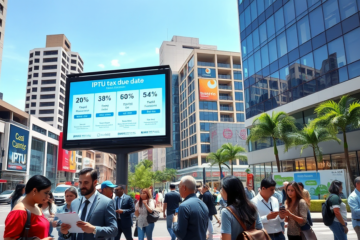Ecological Transformation Plan Increases GDP and Jobs
Sustainable Growth is the central focus of this article, which explores the impact of the Ecological Transformation Plan (ETP) in Brazil through 2035. We will discuss how this plan can not only boost the country's GDP but also create millions of new jobs.
The proposal seeks to harmonize economic growth with the reduction of greenhouse gas emissions, aiming for climate neutrality by 2050. We will analyze the main axes of the PTE, which include sustainable finance, bioeconomy, and green infrastructure, and their importance for a more sustainable and prosperous future for Brazil.
Impact of PTE on GDP growth
O Ecological Transformation Plan (ETP) constitutes a central pillar for Brazil's sustainable growth.
With the expectation of increasing GDP by 0.8 percentage points per year until 2035, the PTE stands out not only for its economic impact, but also for its contribution to reducing greenhouse gas emissions.
This ambitious plan aligns economy and ecology, seeking to climate neutrality by 2050.
You economic gains are particularly evident in the first 10 to 15 years, when the initiative begins to achieve significant and lasting results.
The initial impact of PTE is mainly observed in the creation of 2 million new jobs by 2035, which indicates a positive domino effect, with widely distributed social and economic benefits.
Furthermore, each of the axes of the plan, which include sustainable finance and bioeconomy, strengthens the country's infrastructure, promoting technological innovations and efficiency in production.
The integration of economic growth and emissions reductions results in a virtuous cycle, where more growth generates more capacity to invest in clean technologies.
The energy transition, for example, stimulates the green economy, boosting not only GDP but also ensuring that Brazil achieves its climate goals.
Therefore, the PTE is consolidated as an essential strategy not only for economic growth, but for building a sustainable and balanced future.
Expansion of employment and social benefits
Brazil's Ecological Transformation Plan (ETP) promises a impactful transformation in the job market.
With the aim of creating around 2 million jobs by 2035, the PTE stands out for reconciling economic growth and sustainability.
Comprising six strategic axes, the plan focuses on sectors that are leading the green transition.
Among the main drivers of employment, the following stand out:
- Renewable energy
- Bioeconomy
- Green infrastructure
- Circular economy
.
These fields not only expand job opportunities but also promote important social benefits.
Job creation is directly linked to improving quality of life, reducing inequality, and strengthening local economies.
Reducing greenhouse gas emissions through the PTE not only helps the country achieve its climate goals, but also ensures a more sustainable and equitable future for all.
With the bet on innovation and technology, the PTE establishes a solid foundation for economic growth, ensuring that Brazil advances towards climate neutrality by 2050.
Towards climate neutrality by 2050
Climate neutrality by 2050 is a vital goal that Brazil's Ecological Transformation Plan (ETP) seeks to achieve, underlining its commitment to a sustainable future.
This plan, which could add 0.8 percentage points to GDP annually through 2035, is an essential step toward balancing economic growth and environmental sustainability.
Without this movement, Brazil's climate goals will not be met.
In collaboration with organizations such as the IDB-CEBRI-EPE Program, the PTE charts a path toward sustainability, highlighting the importance of addressing the challenge of climate change.
To achieve its goals, the PTE establishes specific guidelines:
- 50% reduction in net emissions by 2030
- Increasing energy efficiency in key sectors
- Implementation of green infrastructure
- Promoting the circular economy
These goals are crucial to align Brazil with international commitments to reduce greenhouse gases and building a climate-resilient future.
Furthermore, the ecological transition promoted by the PTE aims to generate up to two million new jobs by 2035, highlighting the economic importance of this transformation.
Ultimately, the success of this climate agenda depends on national and international collaboration, reinforcing collective responsibility to achieve a balanced planet for future generations.
For more information, visit the Gov.br Portal on Climate Change.
Six strategic axes of the PTE
The Ecological Transformation Plan (PTE), a crucial Brazilian initiative for sustainable development and the reduction of greenhouse gas emissions, is based on six fundamental strategic axes.
These axes are fundamental to transforming the country's economic and environmental landscape, promoting growth while ensuring climate neutrality by 2050.
| Axle | Description |
|---|---|
| Sustainable finance | They promote the allocation of capital to projects that integrate ecological and social practices, which is essential to guarantee resources for green growth and mitigating climate impacts. |
| Technological densification | It aims to strengthen the development and adoption of innovative technologies, combining productive efficiency with sustainability in all sectors. |
| Bioeconomy | Enables the use of biological resources to promote economic sustainability, encouraging production chains that value biodiversity and native Brazilian products. |
| Energy transition | Focuses on expanding renewable energy sources, reducing dependence on fossil fuels and reducing the country's carbon footprint. |
| Circular economy | It encourages the reuse and recycling of materials, minimizing waste and promoting product longevity. |
| New green infrastructure | Invests in the construction of environmentally friendly infrastructure, focusing on projects that contribute to mitigating climate impacts. |
These axes, when integrated, play a vital role in the transition to a decarbonized economy, placing Brazil as a leader in the fight against climate change.
Additional information can be found at government portal.
In summary, the Ecological Transformation Plan represents a vital opportunity for Brazil, uniting economic development and environmental commitment.
The ecological transition is essential not only for economic growth, but also for ensuring a sustainable future.



0 Comments